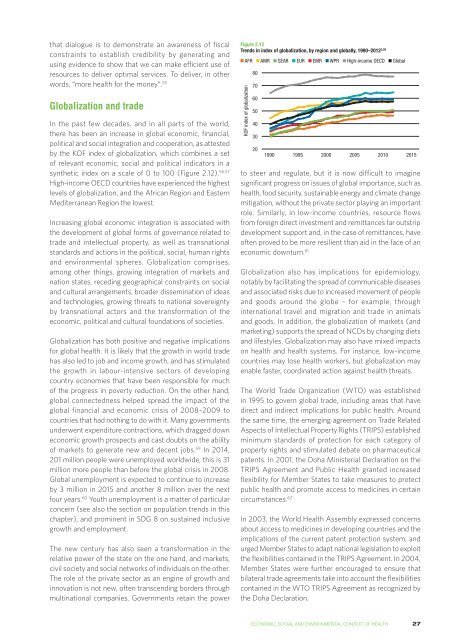Create successful ePaper yourself
Turn your PDF publications into a flip-book with our unique Google optimized e-Paper software.
that dialogue is <strong>to</strong> demonstrate an awareness of fiscal<br />
constraints <strong>to</strong> establish credibility by generating and<br />
using evidence <strong>to</strong> show that we can make efficient use of<br />
resources <strong>to</strong> deliver optimal services. To deliver, in other<br />
words, “more health for the money”. 55<br />
Globalization and trade<br />
In the past few decades, and in all parts of the world,<br />
there has been an increase in global economic, financial,<br />
political and social integration and cooperation, as attested<br />
by the KOF index of globalization, which combines a set<br />
of relevant economic, social and political indica<strong>to</strong>rs in a<br />
synthetic index on a scale of 0 <strong>to</strong> 100 (Figure 2.12). 56,57<br />
High-income OECD countries have experienced the highest<br />
levels of globalization, and the African Region and Eastern<br />
Mediterranean Region the lowest.<br />
Increasing global economic integration is associated with<br />
the development of global forms of governance related <strong>to</strong><br />
trade and intellectual property, as well as transnational<br />
standards and actions in the political, social, human rights<br />
and environmental spheres. Globalization comprises,<br />
among other things, growing integration of markets and<br />
nation states, receding geographical constraints on social<br />
and cultural arrangements, broader dissemination of ideas<br />
and technologies, growing threats <strong>to</strong> national sovereignty<br />
by transnational ac<strong>to</strong>rs and the transformation of the<br />
economic, political and cultural foundations of societies.<br />
Globalization has both positive and negative implications<br />
for global health. It is likely that the growth in world trade<br />
has also led <strong>to</strong> job and income growth, and has stimulated<br />
the growth in labour-intensive sec<strong>to</strong>rs of developing<br />
country economies that have been responsible for much<br />
of the progress in poverty reduction. On the other hand,<br />
global connectedness helped spread the impact of the<br />
global financial and economic crisis of 2008–2009 <strong>to</strong><br />
countries that had nothing <strong>to</strong> do with it. Many governments<br />
underwent expenditure contractions, which dragged down<br />
economic growth prospects and cast doubts on the ability<br />
of markets <strong>to</strong> generate new and decent jobs. 59 In 2014,<br />
201 million people were unemployed worldwide; this is 31<br />
million more people than before the global crisis in 2008.<br />
Global unemployment is expected <strong>to</strong> continue <strong>to</strong> increase<br />
by 3 million in 2015 and another 8 million over the next<br />
four years. 60 Youth unemployment is a matter of particular<br />
concern (see also the section on population trends in this<br />
chapter), and prominent in SDG 8 on sustained inclusive<br />
growth and employment.<br />
The new century has also seen a transformation in the<br />
relative power of the state on the one hand, and markets,<br />
civil society and social networks of individuals on the other.<br />
The role of the private sec<strong>to</strong>r as an engine of growth and<br />
innovation is not new, often transcending borders through<br />
multinational companies. Governments retain the power<br />
Figure 2.12<br />
Trends in index of globalization, by region and globally, 1990–2012 3,58<br />
AFR AMR SEAR EUR EMR WPR High-income OECD Global<br />
KOF index of globalization<br />
80<br />
70<br />
60<br />
50<br />
40<br />
30<br />
20<br />
1990 1995 2000 2005 2010 2015<br />
<strong>to</strong> steer and regulate, but it is now difficult <strong>to</strong> imagine<br />
significant progress on issues of global importance, such as<br />
health, food security, sustainable energy and climate change<br />
mitigation, without the private sec<strong>to</strong>r playing an important<br />
role. Similarly, in low-income countries, resource flows<br />
<strong>from</strong> foreign direct investment and remittances far outstrip<br />
development support and, in the case of remittances, have<br />
often proved <strong>to</strong> be more resilient than aid in the face of an<br />
economic downturn. 61<br />
Globalization also has implications for epidemiology,<br />
notably by facilitating the spread of communicable diseases<br />
and associated risks due <strong>to</strong> increased movement of people<br />
and goods around the globe – for example, through<br />
international travel and migration and trade in animals<br />
and goods. In addition, the globalization of markets (and<br />
marketing) supports the spread of NCDs by changing diets<br />
and lifestyles. Globalization may also have mixed impacts<br />
on health and health systems. For instance, low-income<br />
countries may lose health workers, but globalization may<br />
enable faster, coordinated action against health threats.<br />
The World Trade Organization (WTO) was established<br />
in 1995 <strong>to</strong> govern global trade, including areas that have<br />
direct and indirect implications for public health. Around<br />
the same time, the emerging agreement on Trade Related<br />
Aspects of Intellectual Property Rights (TRIPS) established<br />
minimum standards of protection for each category of<br />
property rights and stimulated debate on pharmaceutical<br />
patents. In 2001, the Doha Ministerial Declaration on the<br />
TRIPS Agreement and Public Health granted increased<br />
flexibility for Member States <strong>to</strong> take measures <strong>to</strong> protect<br />
public health and promote access <strong>to</strong> medicines in certain<br />
circumstances. 62<br />
In 2003, the World Health Assembly expressed concerns<br />
about access <strong>to</strong> medicines in developing countries and the<br />
implications of the current patent protection system, and<br />
urged Member States <strong>to</strong> adapt national legislation <strong>to</strong> exploit<br />
the flexibilities contained in the TRIPS Agreement. In 2004,<br />
Member States were further encouraged <strong>to</strong> ensure that<br />
bilateral trade agreements take in<strong>to</strong> account the flexibilities<br />
contained in the WTO TRIPS Agreement as recognized by<br />
the Doha Declaration.<br />
ECONOMIC, SOCIAL AND ENVIRONMENTAL CONTEXT OF HEALTH<br />
27


